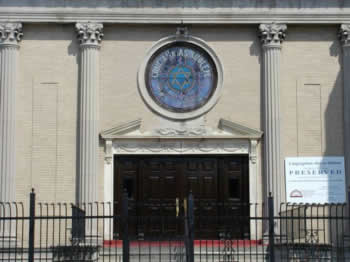|
This City is Just Memories
by Jay Levinson
The Jewish community of Newark, New Jersey is a page in history. The era of some 50 synagogues and 70,000 Jewish residents in the city during the 1950s is long over. Today there is just one remaining synagogue building which is owned by Jews, and it operates only on Shabbat. Once it was Orthodox. Now its Conservative affiliation is its lifeline, offers services to only those who drive since Jews no longer live in the immediate neighborhood.
In another neighborhood there is also a dwindling daily minyan in rented space just a few streets inside the city line. The Jews of Newark are gone. Only memories remain, and they are also fading as time passes.
The situation in Newark is no different from numerous other urban centers, from the East End in London to East New York and Brownsville in Brooklyn. Each in its days was a thriving and vibrant Jewish center. How does one stop the memories of the past from fading? How does one save the history of communities of the past?
In Newark there is a small group of Jews led by Joseph Selzer and Phil Yourish, who are actively grappling with the challenge of establishing a museum so that Jewish history will not be forgotten. The Jewish Museum of New Jersey is still in its formative stages with many basic questions still not resolved. Should the museum cover all of New Jersey or just Newark? How does one orient the museum collection to attract the largest number of visitors? How can it supplement already existent archival collections covering local history?

Exterior of the Newark Synagogue
The history of the Ahavas Sholom Synagogue, where the museum is to be located, very much tells the history of Newark. Since the 1830s there had been a Jewish community in the city, but slowly it moved away from halachic Judaism. Reform philosophy took hold at an early date. The late 19th and early 20th centuries, however, marked a definitive change. Transportation links with New York City improved, and at the same time traditionally oriented immigrants started coming in large numbers from Europe. Many found their homes in Newark.
Newark never became the seat of renown yeshivot. It was a city of traditional, though not very learned, Judaism. That would have an effect in later years.
Ahavas Sholom Synagogue started in rented quarters in 1905 on a street in walking distance from Prince Street, the center of the immigrant community. Like almost all other immigrant synagogues, it was traditional in every respect. The men who davened in the synagogue were storekeepers, who often lived in back rooms of their shops.
The synagogue served the dual functions of prayer and socialization. It would be very unfair to call the synagogue "JCC" or "Y," but there is no doubt that the social aspects of Ahavas Sholom were important to the membership.
As some money became available, the lot adjacent to the rented building was purchased, and a formal synagogue was constructed in 1921. Furnishings were hard to afford with a strained budget, but a solution was found. In 1927 a wealthy New York congregation renovated its facility and donated its impressive aron kodesh (holy ark), which was cut to fit the available space.

The Newark Synagouge Sanctuary
After World War II the original immigrant population was no longer the majority --- not in Ahavas Sholom, not in Newark. The generation was passing. Jews born to the immigrant parents were entering the work force. During the 1950s young families started moving, some to the outskirts of the city, others to suburban towns. The phenomenon hastened in the 1960s, and by the end of the decade only a smattering of Jews remained in Newark. Ahavas Sholom started to become an untenable operation.
Some say that the race riots of 1967 chased Jews from the city. In retrospect it might be fairer to say that the riots only hastened the process, which was well underway. Jews were looking to move up in society, and the suburbs provided that promise.
For many years Ahavas Sholom was all but forgotten. The congregation was never in the center of the community. In a period of social turmoil that saw the decline of major community institution, Ahavas Sholom was the least concern.
Yet, Ahavas Sholom was not totally forgotten. A small core of Jews lived with the dream that a museum could save the fading memories of Newark.
The museum on premises at Ahavas Sholom has changed a congregation with a membership of a handful into a synagogue with over 300 members. The vast majority are either museum supporters or the descendents of past members, who have renewed interest in the synagogue of their ancestors.
Several cities have established museums in synagogues of the past. This is true in Manchester. This is true in Miami Beach. This is true in Washington, D.C. And, this is now true in Newark. The balcony of the shul is being refitted as the home of the nascent museum.
Regarding the balcony and not ezrat noshim (Women’s section,
as the museum directors started to collect material, they also learned about the history of the building. It was thought that women sat upstairs and men downstairs, but such was not the case. In all probability only a few women attended services in the early days of Ahavas Sholom, and they were accommodated in a women's section of the main floor. The balcony was used not for women, but for classrooms!
The Jewish Museum of New Jersey is located at Congregation Ahavas Sholom, 145 Broadway, Newark, New Jersey 07104. At this point there are no exhibits to be seen, but there are occasional lectures about local Jewish history. Details can be obtained by letter or by calling (973) 227-8854.
~~~~~~~
from the May 2007 Edition of the Jewish Magazine
|










